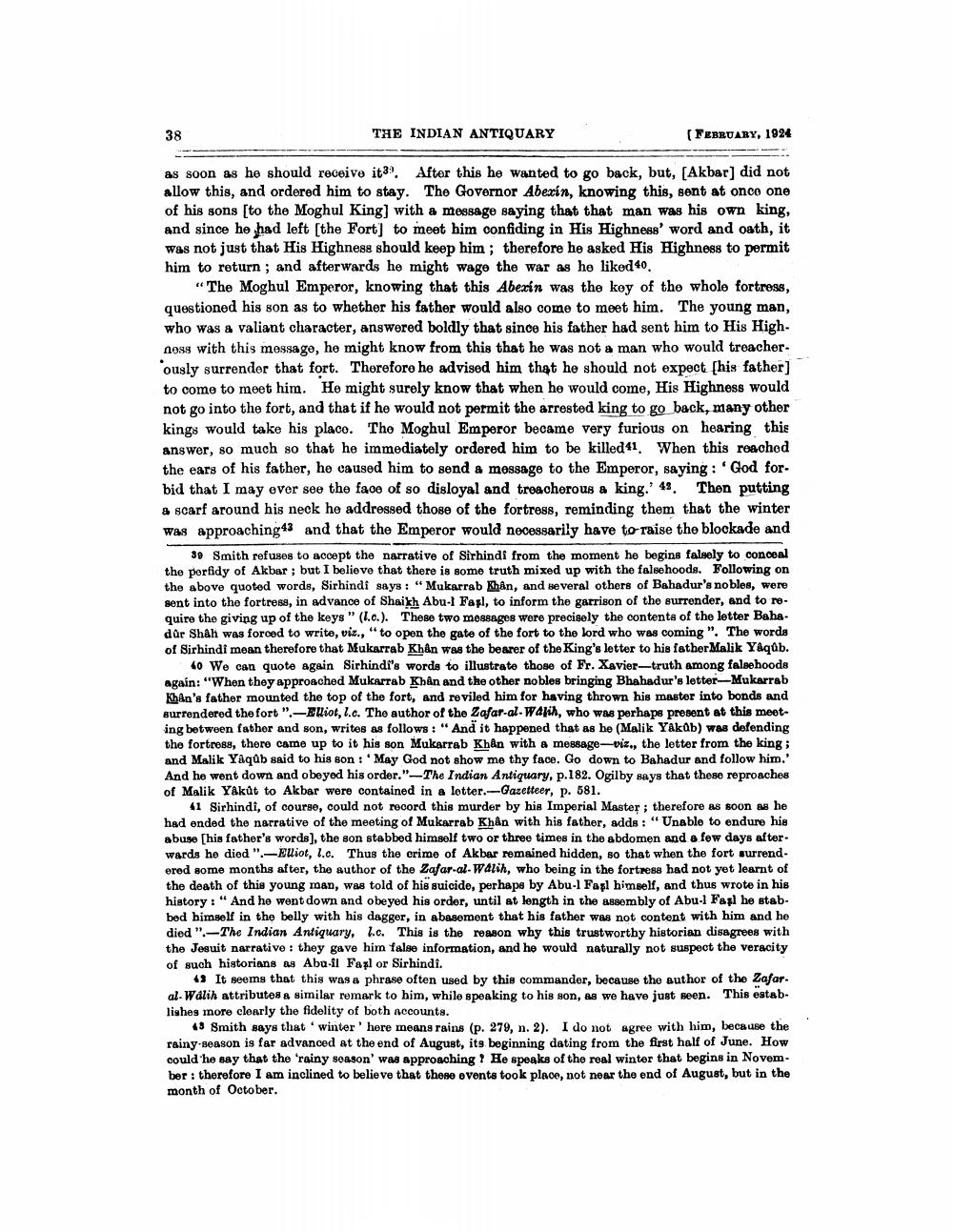________________
38
THE INDIAN ANTIQUARY
(FEBRUARY, 1924
as soon as he should receive it3). After this he wanted to go back, but, [Akbar) did not allow this, and ordered him to stay. The Governor Aberin, knowing this, sent at once one of his sons [to the Moghul King) with a message saying that that man was his own king, and since he had left [the Fort] to meet him confiding in His Highness' word and oath, it was not just that His Highness should keep him; therefore he asked His Highness to permit him to return; and afterwards he might wage the war as he liked 40.
"The Moghul Emperor, knowing that this Abexin was the key of the whole fortress, questioned his son as to whether his father would also come to meet him. The young man, who was a valiant character, answered boldly that since his father had sent him to His Highnoss with this message, he might know from this that he was not a man who would treacher'ously surrender that fort. Therefore he advised him that he should not expect this father] to come to meet him. He might surely know that when he would come, His Highness would not go into the fort, and that if he would not permit the arrested king to go back, many other kings would take his placo. Tho Moghul Emperor became very furious on hearing this answer, so much so that he immediately ordered him to be killed 41. When this reached the ears of his father, he caused him to send a message to the Emperor, saying: 'God for. bid that I may ever see the face of so disloyal and treacherous a king.' 43. Then putting & scarf around his neck he addressed those of the fortress, reminding them that the winter was approaching 43 and that the Emperor would necessarily have to raise the blockade and
39 Smith refuses to accept the narrative of Sirhindi from the moment he begins falsely to conceal the perfidy of Akbar; but I believe that there is some truth mixed up with the falsehoods. Following on the above quotod words, Sirhindi says: "Mukarrab Khan, and several others of Bahadur's nobles, were sent into the fortress, in advance of Shaikh Abu-l Fasl, to inform the garrison of the surrender, and to require the giving up of the keys" (1.c.). These two messages were precisely the contents of the letter Babadär Shah was forced to writo, vit., "to open the gate of the fort to the lord who was coming". The words of Sirhindi mean therefore that Mukarrab Khan was the bearer of the King's letter to his father Malik Yaqub.
40 We can quote again Sirhindi's words to illustrate those of Fr. Xavier-truth among falsehoods again: "When they approached Mukarrab Khan and the other nobles bringing Bhahadur's letter-Mukarrab Khan's father mounted the top of the fort, and reviled him for having thrown his master into bonds and surrendered the fort".-Elliot, 1.c. The author of the Zafar-al-wahh, who was perhape present at this meeting between father and son, writes as follows: "And it happened that as he (Malik Yakub) was defending the fortress, there came up to it his son Mukarrab Khân with a message-viz., the letter from the king; and Malik Yaqub said to his son : May God not show me thy face. Go down to Bahadur and follow him.' And he went down and obeyed his order."--The Indian Antiquary, p.182. Ogilby says that these reproaches of Malik Yakut to Akbar were contained in a lotter.--Gazetteer, p. 581.
41 Sirhindi, of course, could not record this murder by his Imperial Master; therefore as soon as he had ended the narrative of the meeting of Mukarrab Khan with his father, adds: “Unable to endure his abuse (his father's words), the son stabbed himself two or three times in the abdomen and a few days after. wards he died ".-Elliot, 1.c. Thus the crime of Akbar remained hidden, so that when the fort surrendered some months after, the author of the Zafar-al-wali, who being in the fortress had not yet learnt of the death of this young man, was told of his suicide, perhaps by Abu-l Farl himself, and thus wrote in his history: "And he went down and obeyed his order, until at length in the assembly of Abu-l Farl he stabbed himself in the belly with his dagger, in abasement that his father was not content with him and he died ".-The Indian Antiquary, 1.c. This is the reason why this trustworthy historian disagrees with the Jesuit narrative : they gave him false information, and he would naturally not suspect the veracity of such historians as Abu-il Fapl or Sirhindi.
43 It seems that this was a phrase often used by this commander, because the author of the Zafar. al-Walih attributes a similar remark to him, while speaking to his son, as we have just seen. This establishes more clearly the fidelity of both accounts.
13 Smith says that winter' here means rains (p. 279, n. 2). I do not agree with him, because the rainy season is far advanced at the end of August, its beginning dating from the first half of June. How could he say that the trainy sonson' was approaching ! He speaks of the real winter that begins in Novem ber: therefore I am inclined to believe that these events took place, not near the end of August, but in the month of October.




